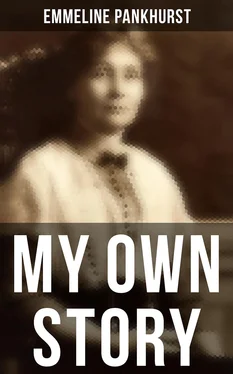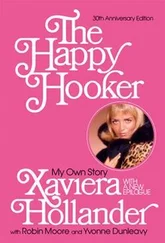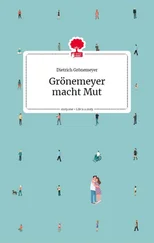This, then, was our situation: the Government all-powerful and consistently hostile; the rank and file of legislators impotent; the country apathetic; the women divided in their interests. The Women's Social and Political Union was established to meet this situation, and to overcome it. Moreover we had a policy which, if persisted in long enough, could not possibly fail to overcome it. Do you wonder that we gained new members at every meeting we held?
There was little formality about joining the Union. Any woman could become a member by paying a shilling, but at the same time she was required to sign a declaration of loyal adherence to our policy and a pledge not to work for any political party until the women's vote was won. This is still our inflexible custom. Moreover, if at any time a member, or a group of members, loses faith in our policy; if any one begins to suggest, that some other policy ought to be substituted, or if she tries to confuse the issue by adding other policies, she ceases at once to be a member. Autocratic? Quite so. But, you may object, a suffrage organisation ought to be democratic. Well the members of the W. S. P. U. do not agree with you. We do not believe in the effectiveness of the ordinary suffrage organisation. The W. S. P. U. is not hampered by a complexity of rules. We have no constitution and by-laws; nothing to be amended or tinkered with or quarrelled over at an annual meeting. In fact, we have no annual meeting, no business sessions, no elections of officers. The W. S. P. U. is simply a suffrage army in the field. It is purely a volunteer army, and no one is obliged to remain in it. Indeed we don't want anybody to remain in it who does not ardently believe in the policy of the army.
The foundation of our policy is opposition to a Government who refuse votes to women. To support by word or deed a Government hostile to woman suffrage is simply to invite them to go on being hostile. We oppose the Liberal party because it is in power. We would oppose a Unionist government if it were in power and were opposed to woman suffrage. We say to women that as long as they remain in the ranks of the Liberal party they give their tacit approval to the Government's anti-suffrage policy. We say to members of Parliament that as long as they support any of the Government's policies they give their tacit approval to the anti-suffrage policy. We call upon all sincere suffragists to leave the Liberal party until women are given votes on equal terms with men. We call upon all voters to vote against Liberal candidates until the Liberal Government does justice to women.
We did not invent this policy. It was most successfully pursued by Mr. Parnell in his Home Rule struggle more than thirty-five years ago. Any one who is old enough to remember the stirring days of Parnell may recall how, in 1885, the Home Rulers, by persistently voting against the Government in the House of Commons, forced the resignation of Mr. Gladstone and his Cabinet. In the general election which followed, the Liberal party was again returned to power, but by the slender majority of eighty-four, the Home Rulers having fought every Liberal candidate, even those, who, like my husband, were enthusiastic believers in Home Rule. In order to control the House and keep his leadership, Mr. Gladstone was obliged to bring in a Government Home Rule Bill. The downfall, through private intrigue, and the subsequent death of Parnell prevented the bill from becoming law. For many years afterward the Irish Nationalists had no leader strong enough to carry on Parnell's anti-government policy, but within late years it was resumed by Mr. James Redmond, with the result that the Commons passed a Home Rule Bill.
The contention of the old-fashioned suffragists, and of the politicians as well, has always been that an educated public opinion will ultimately give votes to women without any great force being exerted in behalf of the reform. We agree that public opinion must be educated, but we contend that even an educated public opinion is useless unless it is vigorously utilised. The keenest weapon is powerless unless it is courageously wielded. In the year 1906 there was an immensely large public opinion in favour of woman suffrage. But what good did that do the cause? We called upon the public for a great deal more than sympathy. We called upon it to demand of the Government to yield to public opinion and give women votes. And we declared that we would wage war, not only on all anti-suffrage forces, but on all neutral and non-active forces. Every man with a vote was considered a foe to woman suffrage unless he was prepared to be actively a friend.
Not that we believed that the campaign of education ought to be given up. On the contrary, we knew that education must go on, and in much more vigorous fashion than ever before. The first thing we did was to enter upon a sensational campaign to arouse the public to the importance of woman suffrage, and to interest it in our plans for forcing the Government's hands. I think we can claim that our success in this regard was instant, and that it has proved permanent. From the very first, in those early London days, when we were few in numbers and very poor in purse, we made the public aware of the woman suffrage movement as it had never been before. We adopted Salvation Army methods and went out into the highways and the byways after converts. We threw away all our conventional notions of what was "ladylike" and "good form," and we applied to our methods the one test question, Will it help? Just as the Booths and their followers took religion to the street crowds in such fashion that the church people were horrified, so we took suffrage to the general public in a manner that amazed and scandalised the other suffragists.
We had a lot of suffrage literature printed, and day by day our members went forth and held street meetings. Selecting a favourable spot, with a chair for a rostrum, one of us would ring a bell until people began to stop to see what was going to happen. What happened, of course, was a lively suffrage speech, and the distribution of literature. Soon after our campaign had started, the sound of the bell was a signal for a crowd to spring up as if by magic. All over the neighbourhood you heard the cry: "Here are the Suffragettes! Come on!" We covered London in this way; we never lacked an audience, and best of all, an audience to which the woman-suffrage doctrine was new. We were increasing our favourable public as well as waking it up. Besides these street meetings, we held many hall and drawing-room meetings, and we got a great deal of press publicity, which was something never accorded the older suffrage methods.
Our plans included the introduction of a Government suffrage bill at the earliest possible moment, and in the spring of 1906 we sent a deputation of about thirty of our members to interview the Prime Minister, Sir Henry Campbell-Bannerman. The Prime Minister, it was stated, was not at home; so in a few days we sent another deputation. This time the servant agreed to carry our request to the Prime Minister. The women waited patiently on the doorstep of the official residence, No. 10 Downing Street, for nearly an hour. Then the door opened and two men appeared. One of the men addressed the leader of the deputation, roughly ordering her and the others to leave. "We have sent a message to the Prime Minister," she replied, "and we are waiting for the answer." "There will be no answer," was the stern rejoinder, and the door closed.
"Yes, there will be an answer," exclaimed the leader, and she seized the door-knocker and banged it sharply. Instantly the men reappeared, and one of them called to a policeman standing near, "Take this woman in charge." The order was obeyed, and the peaceful deputation saw its leader taken off to Canon Row Station.
Instantly the women protested vigorously. Annie Kenney began to address the crowd that had gathered, and Mrs. Drummond actually forced her way past the doorkeeper into the sacred residence of the Prime Minister of the British Empire! Her arrest and Annie's followed. The three women were detained at the police station for about an hour, long enough, the Prime Minister probably thought, to frighten them thoroughly and teach them not to do such dreadful things again. Then he sent them word that he had decided not to prosecute them, but would, on the contrary, receive a deputation from the W. S. P. U., and, if they cared to attend, from other suffrage societies as well.
Читать дальше












